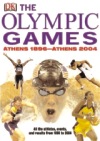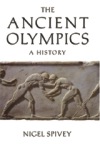|
Books
The
Olympics
Sanyat
Sattar
 The
Complete Book of the Summer Olympics The
Complete Book of the Summer Olympics
David Wallechinsky
Sportclassic Books; July 2004
The
gold medal for chronicling the modern Olympics, at every Olympiad
since the Los Angeles Summer Games of 1984, has gone to renowned
historian David Wallechinsky. His Magnus opus, The Complete
Book of the Summer Olympics, has been called the "Bible
of the Olympics." Completely updated for the 2004 Athens
Games, this ultimate reference book contains all-time Olympic
records, statistics and medal standings, as well as results
of the top eight finishers in every Olympic event from 1896
to 2000. It also carries, in Wallechinsky's colourful narrative
style, a complete history of the Games plus the inside stories
of the major competitors and events in each and every Olympiad.
 The
Olympic Games The
Olympic Games
DK Publishing Inc
DK Publishing Inc; May 2004
The
Olympic tradition began in ancient Greece as early as 776
BC. The first modern games were held in Athens, more than
two millennia later in 1896. In this summer the Games returned
to the country of their birth. This updated edition previews
the historic Games, and covers the beautiful venues, inspiring
athletes, and the spectacle surrounding the world's greatest
sporting event. Features include an index of important facts
as well as detailed statistical information about every medal
winner since the first modern games. Covering 44 Olympiads
over a century, stunning action photos taken by top sports
journalists capture the true spirit of the games.
 The
Ancient Olympics: A History The
Ancient Olympics: A History
Nigel Spivey
Oxford University Press; August 2004
The word
'athletics' is derived from the Greek verb 'to struggle or
to suffer for a prize.' As Nigel Spivey reveals in this engaging
account of the Olympics in ancient Greece, 'suffer' is putting
it mildly. Indeed, the Olympics were not so much a graceful
display of Greek beauty as a war fought by other means. Nigel
Spivey paints a portrait of the Greek Olympics as they really
were--fierce contexts between bitter rivals, in which victors
won kudos and rewards, and losers faced scorn and even assault.
The author explores what the events were, the rules for competitors,
training and diet, the pervasiveness of cheating and bribery,
the prizes on offer, the exclusion of 'barbarians,' and protocols
on pederasty. He also peels back the mythology surrounding
the games today and investigates where our current conception
of the Olympics has come from and how the Greek notions of
beauty and competitiveness have influenced our modern culture.
Anyone interested in the ancient world or in the Olympic Games
will be fascinated by this revealing history.
(sanyatsattar@hotmail.com)
Copyright (R)
thedailystar.net 2004
|
